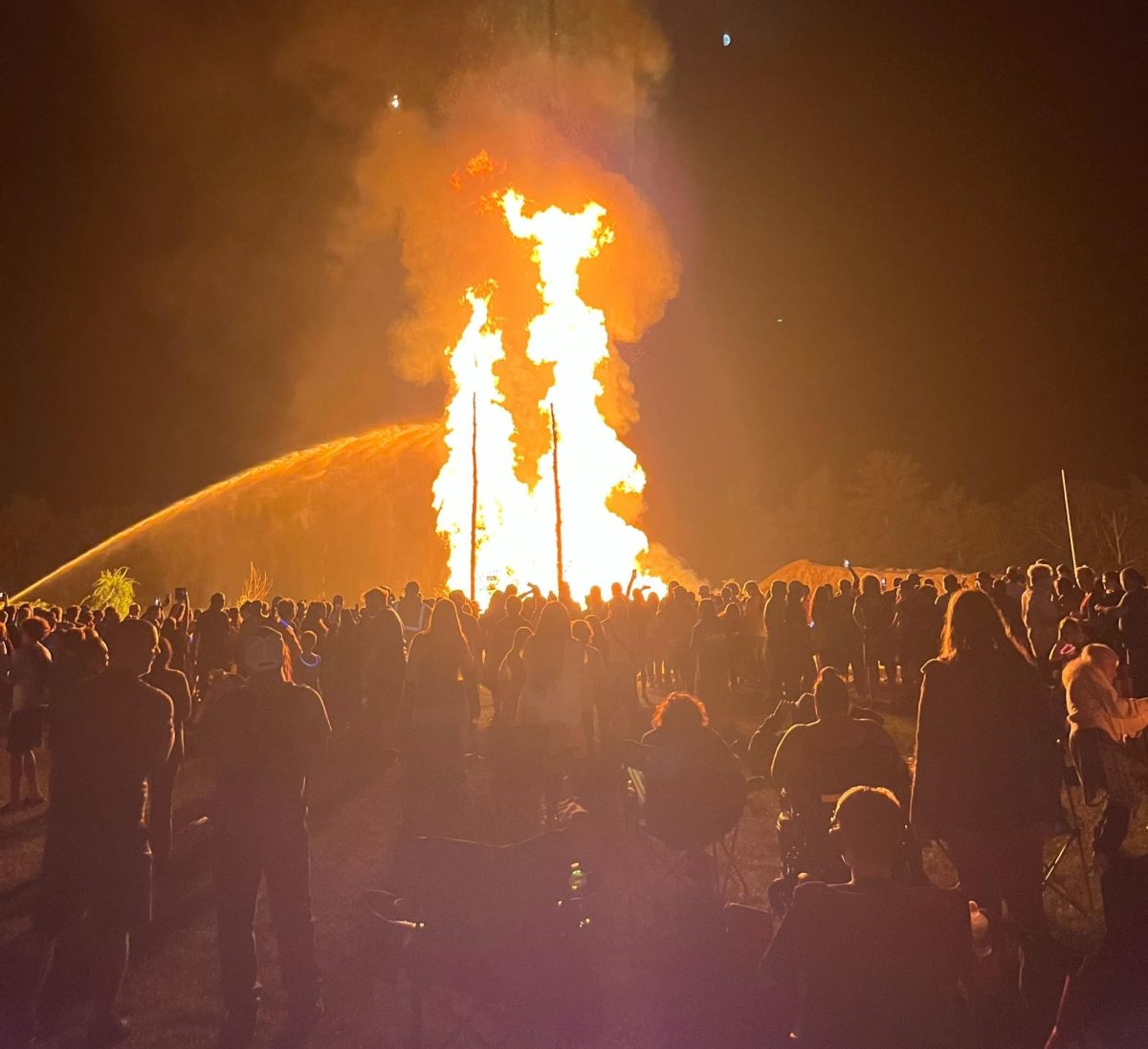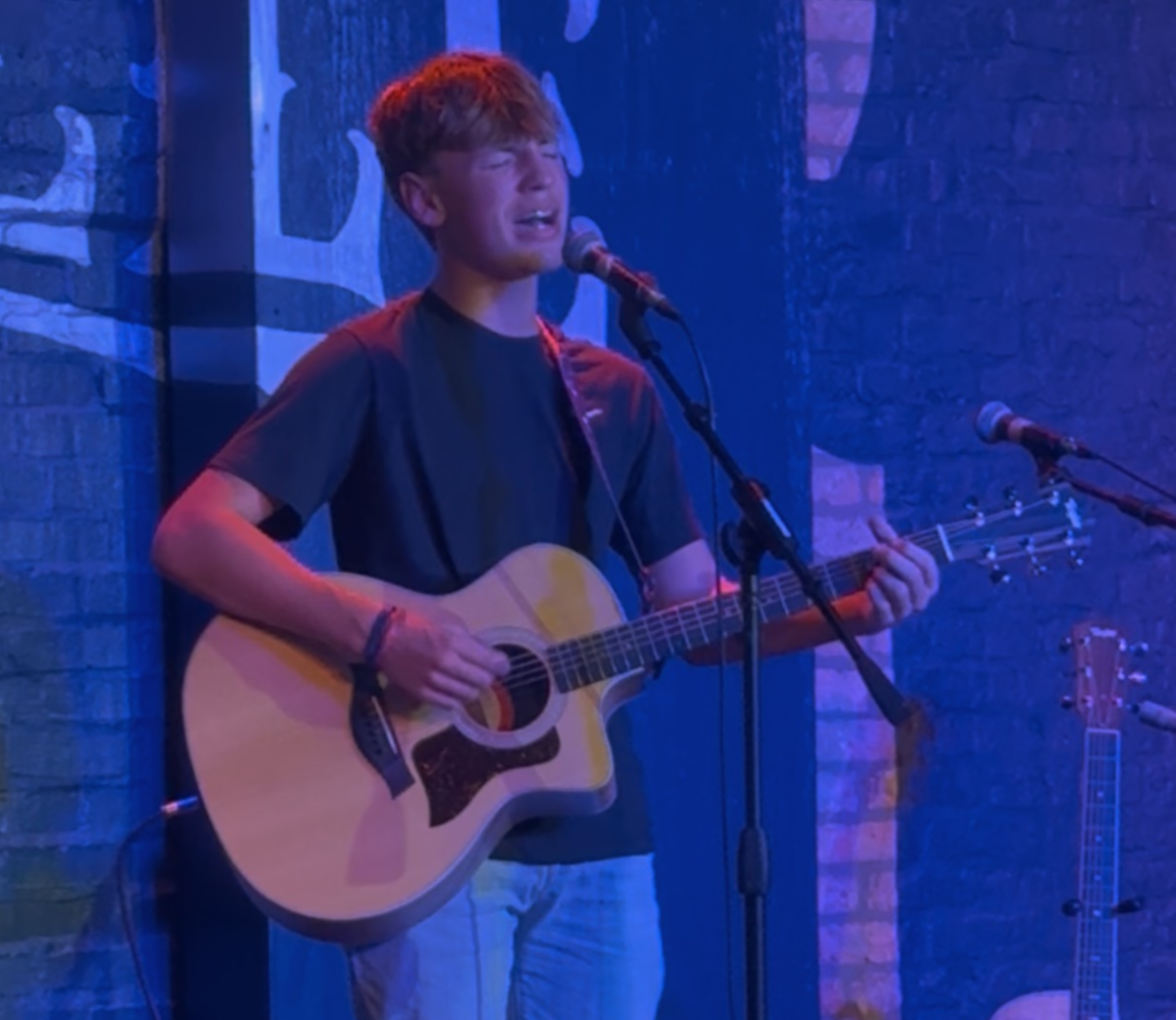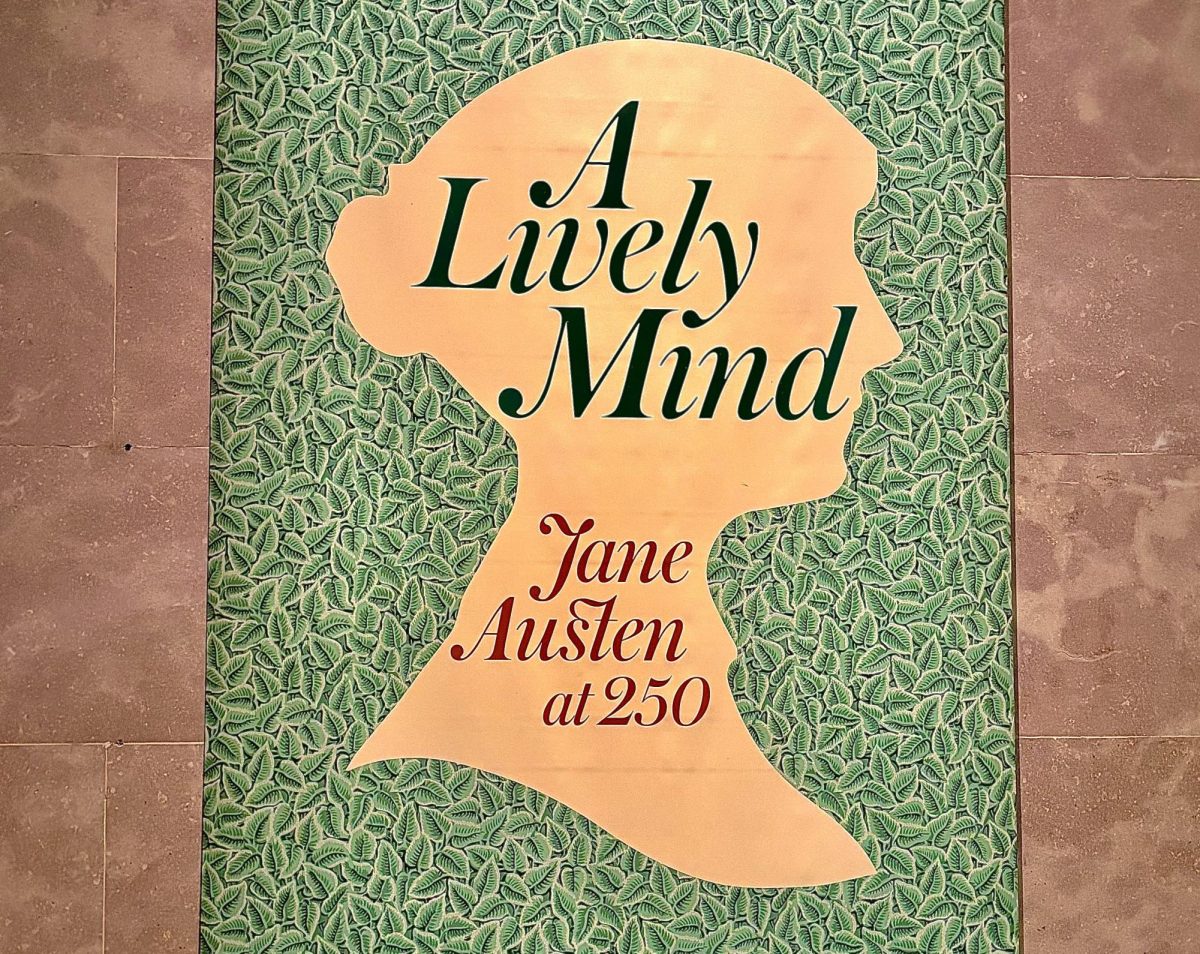Amber Run talks “Philophobia” and how the new album came together
Joshua “Joe” Keogh, Tom Sperring, and Henry Wyeth sit down for interview before recent show in Brooklyn
Amber Run — (from left) Henry Wyeth (keyboards), Joshua Keogh (lead singer), Michael Blackwell (guitar), Tom Sperring (bass), and Glyn Daniels (drums) — perform during a tour stop at Warsaw in Brooklyn, N.Y., on Nov. 2, 2019.
November 16, 2019
On Nov. 2, 2019, I had the pleasure of interviewing UK-based rock band Amber Run in Brooklyn, N.Y., on their latest album “Philophobia”. The band — Joshua “Joe” Keogh (lead singer), Tom Sperring (bassist), and Henry Wyeth (keyboardist) — graciously sat down with me at Warsaw, the Polish concert venue they were set to perform at in less than two hours to answer my burning questions.
AMERA: When I first heard the seamless blend between “Leader Countdown” and “Neon Circus” I felt as though the whole album should be listened to in order. Was that your intention?
TOM: It wasn’t written and recorded in that exact order, it was put together that way for a reason. I think we’re all fans of albums as a whole and the fact that you should listen to an album from start to finish is the reason we put them in that order, I would encourage anyone to listen to it from start to finish. I know people won’t, I know people are going to choose their favorite songs, that’s fine but we would prefer you to do so.
JOE: “Leader Countdown” was very deliberate to create a palate cleanser before you start the rest of the record. We wanted to create a feel, a theme, at the beginning of the record to be able to do what we wanted after that.
AMERA: What inspired the theme that you’re talking about?
JOE: One of the big impacting things that was going on during the writing of this record was Henry doing some work at a cinema. We started talking a lot more about cinematography and the role of cinema as an art form, that was where that came from for me. You were talking about the movement of the album as a whole, we tried to create a story arc that you would see in a film or a TV program, that was the intention of how we chose the track list. That ties into the cinema aesthetic.
HENRY: It’s more looking at other art forms for inspiration instead of just what bands you like, what music you listen to. We branched out a bit more and took some from TV shows and films and books and that’s how it sort of filtered in.
AMERA: What was the biggest challenge you faced when writing this album and how did you overcome it?
COLLECTIVELY: The title.
TOM: The songs, there were only a couple that took some real work in the studio, but the songs came fairly easily so none of that was such a struggle. I guess we had a bigger pool of songs so cutting some of them— the biggest thing was the title of the record.
HENRY: Of the songs on the album, the one that caused the most deliberation was “Worship”. It had a couple of different costumes and we were thinking of the best way to go forward with it and we loved the way it finished up.
AMERA: Why did “Worship” make the perfect conclusion to “Philophobia”?
JOE: I threw a hissy fit. There was a costume that was a lot more up beat and it had a real energy to it but when you write, you’ve got a vision of how it should turn out. When I started that song, before I brought it to the group at whole, I had a vision of how I wanted it to sound and it wasn’t sounding like that.
AMERA: These songs are unlike anything we’ve heard from you previously, was it hard for you to veer from what you traditionally wrote to what you’re writing now?
TOM: I don’t think so. It wasn’t a deliberate change of direction, it came quite naturally.
HENRY: Musically we were trying to push ourselves with new styles in the studio, for us we’re so in the music. The people in the audience only get 12 songs and then two years, three years, and 12 songs, and maybe an EP every now and then but we’re constantly living with that and we’re constantly evolving. We aren’t saying, “We’re going to make this kind of album,” it was a natural organic thing that happens when people spend that much time around each other and play music that much.
JOE: It’s slightly different, not as an intention but if we kept regurgitating the same stuff it would get really boring for us, and if we get bored then the people who listen to our music will get bored pretty quickly as well so you’ve got to keep trying new stuff, new ways of writing music. When bands sound tired, you can tell.
AMERA: Did your writing process differ with this album compared to the last one or is it also something that comes naturally?
JOE: There’s no handbook to this stuff, and if there is it shouldn’t be read and it shouldn’t be adhered to. It happens different every time because that’s what keeps the whole thing interesting, as we said before. As this band progresses, it gets more and more collaborative which means the music gets better and better because when you surround yourself with talented people like I have, you get to keep growing as a writer and as a musician. I’d say this is our most collaborative record but I know I’ll say that about the next one as well.
AMERA: What song are you most excited to/dreading performing from “Philophobia”?
JOE: The one I enjoy singing the most from the record is “What Could Be as Lonely as Love” because it’s so fun to see people grooving to something that’s so desperately sad. That contrast I found really interesting.
HENRY: We open the set with “Neon Circus”, that in terms of excitement to play — there’s always that “getting on stage, I want to do this” before every show. So hearing “Leader Countdown” go off and walking out there and getting prepped is pretty exciting.
JOE: It’s one of those tunes that I have to play quite — it’s not a difficult guitar part but I don’t think of myself as a particularly proficient guitarist and I have to play all of this different stuff so I’m always excited, but dreading walking on stage everyday just in case I screw it up. Haven’t screwed it up yet!
AMERA: The definition of the word philophobia is “the fear of falling in love,” what message do you want fans to take away after listening to the album from start to finish?
JOE: I’m not entirely sure Amber Run is the kind of band that we want to shove a message down your throat and tell you how you should feel. “Philophobia” as a record is an expiration of relationships of all forms, platonic, romantic, or the relationship you have with yourself. We just want to give people the information to be able to make the decisions they want to make and be the best base possible to make good ones. We would never assume our importance to people, to be like “you should be doing this” or “you should be doing that.” This band for me is a tool to be able to explore how I feel about stuff so if other people can find that kind of space to be able to do that too, then that’s what we’re trying to do.
HENRY: It’s a really cool thing when fans come up to you and say, “X, Y, and Z because of this song” and you realize how one song can mean plenty of things to different people.
AMERA: What song meant the most to you off this record?
JOE: For different reasons than lyrical, I would say “Worship” is really important to me because it had many guises before the one we fell on, the costume it was given at the end was one I really fought for so to be given the trust from my bandmates that this is the best form we can put out meant a lot to me.
HENRY: Maybe “What Could Be as Lonely as Love,” it’s unlike anything we’ve made before, really. So I’m quite proud of that one, just the way it turned out and the way we tackled it. It was a lot of fun.
TOM: I agree.
AMERA: Why is a lion the bands logo? What is the significance?
JOE: It was something we started the band with and it was something that people started associating with what we do so we continued it. A lot of beginning stuff, like picking a name, none of it really means anything until you put out something and then it starts to mean a lot. I’m not saying that the lion is going to be our banner forever, but it’s a common thread. Having lost members and changed perspectives, to have that badge feels quite important to me still. But maybe that feeling will change, I don’t know.
AMERA: How do you know when an album is done? How do you get over that fear that maybe something is missing?
COLLECTIVELY: You don’t.
HENRY: An album can be going on forever. There are horror stories of people who have a great first album and they get infinite amounts of money and time to write a second album, they never finish it because as a creator you always want to be making “that next song” and then you fall in love with the newest one and the old ones go. It’s about looking at yourself and being like “this is what we’ve got now, this is what we’ve done.” We know as a band that our fourth album will be better than the third, in the same way that in my opinion the third is better than the second, and the second is better than the first. Not that I don’t love the previous ones but if you’re not doing the best stuff on the next one then what are you doing? So, it’s about giving yourself a chance and also the people who are consuming it to listen to songs without scrapping albums worth of stuff.
JOE: It’s also really important to remember that songs are moments in time and the perspective that you’re in, in a singular moment. We should be putting out music about how we’re feeling at that specific moment. That’s really important because otherwise the album becomes very disjointed and the songs won’t understand each other, and we won’t be able to create the kind of narratives that we have. We won’t be able to create the narratives we have that you said you enjoy off this record, that would be unfeasible if we didn’t release music as it came.
TOM: You feel that it’s ready but you could always write another song.
JOE: You could literally go on forever. Those who do, I do understand the plight but someday you need to draw a line under it be like “I’m ready to move on to the next bit.”
–Nov. 16, 2019–























